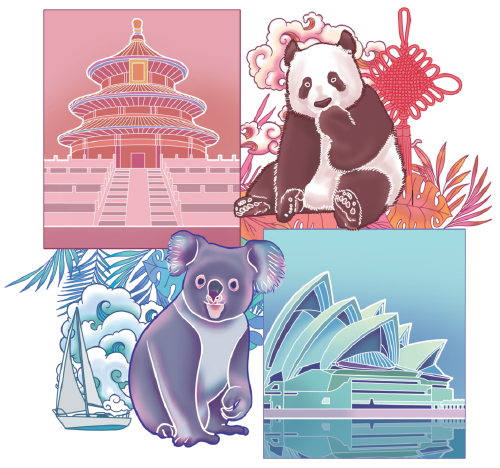Wang's visit to Australia could mean back to business


Foreign Minister Wang Yi's visit to Australia on Wednesday and Thursday should signal a return to a healthy economic relationship between Beijing and Canberra. Both countries have benefited from strong complementarities in trade, investment, education and tourism. But despite the free trade agreement between them, their relations deteriorated in recent years due to a series of trade disputes, and were compounded by disruptions to tourism and other bilateral activities because of the COVID-19 pandemic.
Incidentally, this is the first visit by a Chinese foreign minister to Australia in seven years. As such, businesses and consumers in both countries welcome the visit in the hope that it would normalize Sino-Australian relations.
Wang is expected to meet Australian Prime Minister Anthony Albanese and Foreign Minister Penny Wong during his visit, and their talks will focus on the Seventh Australia-China Foreign and Strategic Dialogue, a high-level series of discussions to understand each other's interests and to explore new areas of cooperation. And since this year marks the 10th anniversary of the comprehensive strategic partnership between the two countries, the two sides will also discuss how to strengthen this special partnership.
There is speculation that China will withdraw the extra tariff on Australian wine and lift other trade bans including the ban on the import of live lobsters from Australia in the near future. This should remove a key obstacle to Australia supporting China's entry into the Comprehensive and Progressive Agreement for Trans-Pacific Partnership and bilateral science and technology cooperation under a new science and technology agreement.
Since the election of Albanese as Australian prime minister in 2022, steps have been taken by both sides to tamp down the fiery rhetoric that damaged the bilateral relationship. While the two countries have different perspectives on international security issues, with Australia being a traditional US ally, many believe China and Australia can prosper together while helping maintain peace and stability in the Asia-Pacific region.
Indeed, many Australians do not see the security issue as a binary choice preventing Canberra from strengthening its relationships with different countries in the region. According to a recent poll conducted by Guardian Australia, about 38 percent of the respondents said they believe the country's primary role in global affairs should be as "an independent middle power". Only 20 percent of the respondents said it should be as "primarily an ally of the US".
Diversity is one of the key features of Australian society, defying any simplistic generalizations about the Australian people's views on the country's place in the world. But one thing is for sure, the Australian economy is deeply integrated with the powerhouse economies of Asia and, by default, with the Chinese economy. Its business community will seek diversification of economic opportunities as well as mutually beneficial relations with its Chinese counterpart.
Australia will likely remain an important supplier of traditional products such as iron ore, other minerals and agricultural commodities to China. China is an important supplier of manufactured products, and a major source of foreign students and tourists to Australia. In fact, bilateral trade increased to A$316.9 billion (about $208 billion) in 2022-23 according to Australia's official figures.
Australia and China also have the opportunity to collaborate in the new productive industries, as both sides switch to renewable energy, develop and implement new battery technology, and secure the supply chains for critical inputs to the digital economy. For example, Australia is a major supplier of lithium to China, and while there have been attempts to diversify the lithium supply chains by numerous countries, falling lithium prices mean new projects are unlikely to be operational in the near future. Australia remains a cost competitive and stable supplier, as long as normal bilateral relations can be sustained.
The Albanese government will be looking for dispute-free cooperation with China in the future, as it faces an election in 2025 and must compete with an opposition that continues to play the "China threat" card. Given the failure of the previous Australian government's aggressive posture to win popular support, the more moderate approach of the Albanese government appears likely to push bilateral ties in the right direction. Therefore, both sides should continue to search for common ground wherever possible, while agreeing to disagree in those areas where common ground cannot be found. Such a mature approach will serve both sides well in the future.
The Australia-China relationship is a litmus test which, in some ways, will determine China's relations with the West. For decades, Australia and China enjoyed a fruitful economic partnership, but things turned sour after the United States triggered a "strategic competition" with China in 2017 under the Donald Trump administration. Hence, China and Australia returning to a stable relationship will show the world that two very different countries can sustain mutually beneficial relations with wise leadership.
The author is a former Australian and multilateral diplomat, a non-resident senior fellow at Beijing-based Center for China and Globalization and a senior research fellow at the Beijing Foreign Studies University.
The views don't necessarily reflect those of China Daily.
If you have a specific expertise, or would like to share your thought about our stories, then send us your writings at opinion@chinadaily.com.cn, and comment@chinadaily.com.cn.

































